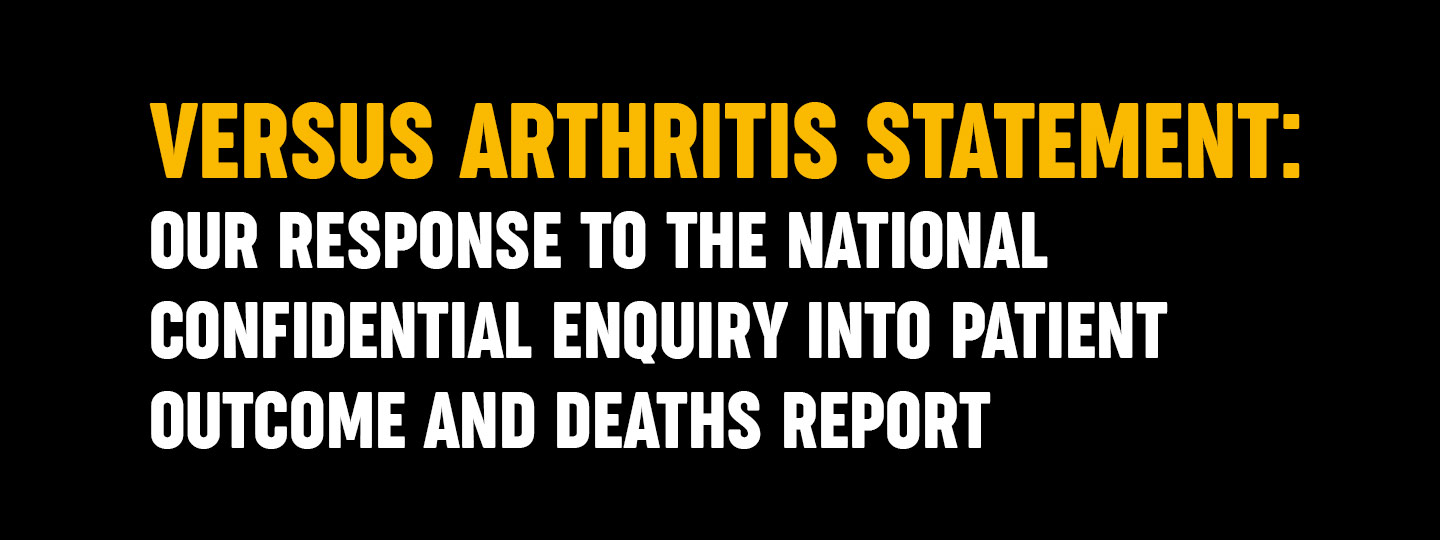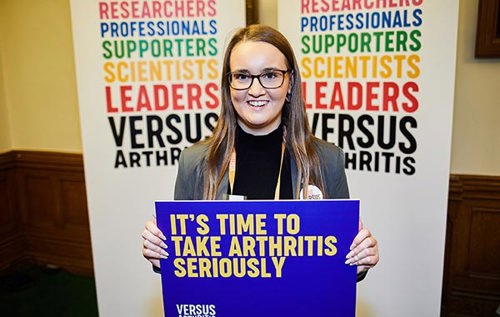Versus Arthritis Statement
13 February 2025
Publication of the National Confidential Enquiry into Patient Outcome and Deaths’ report into the quality of care provided to children and young adults with juvenile idiopathic arthritis.
Lack of awareness among health professionals of a condition that affects 10,000 children in the UK is resulting in many young patients “bouncing around” the NHS, according to a new national report released today. The National Confidential Enquiry into Patient Outcome and Deaths’ report into the quality of care provided to children and young adults with juvenile idiopathic arthritis (JIA) also concluded that swift diagnosis was often based “on luck”.
JIA is an autoimmune disease that can occur in children of any age under 16 that causes painful, swollen or stiff joints that can be debilitating, requiring prompt intervention to prevent long term joint damage.
The report was written with the aid of a multi-disciplinary group comprising of paediatric consultants, clinical nurse specialists and allied health professionals. They peer reviewed 290 sets of case notes and patient, primary care and clinician questionnaire responses.
The report, commissioned by the Healthcare Quality Improvement Partnership (HQIP) to improve standards of care, found:
- Fewer than half of patients who would go on to be diagnosed with JIA were seen within the recommended 10 weeks from the onset of symptoms. The longest a patient waited was 175 weeks.
- Reasons for delays varied, but in more than a third of cases referrals were sent to the wrong specialities.
- Undiagnosed patients were frequently seen to ‘bounce’ between primary care and various specialties, and then back to primary care before being seen by rheumatology services.
- 37% of parents and carers surveyed felt they were not taken seriously by their GP.
- Once a diagnosis had been made, the report found that not all children had access to all recommended treatments for JIA.
Report authors concluded many patients were not being referred to the appropriate rheumatology services early enough and a swift referral was often based “on luck”. It also found there was an absence of standardised protocols for treating juvenile idiopathic arthritis (JIA). This included treatment, concluding that there is an existing medication pathway for JIA but this pathway does not include all currently available treatments and varies considerably around the UK leading to inequalities of access to therapy.
Dr Katie Malbon, NCEPOD clinical coordinator and report co-author said:
“This report shows that education and training regarding a child or young person presenting with a painful swollen joint is clearly lacking. Earlier recognition that JIA may be the diagnosis is paramount along with clear pathways to specialist rheumatology care. A holistic and MDT approach in the management of patients with JIA is essential. The absence of clear national guidance leads to variation in care and ultimately inequity of care which is currently dependent on availability of resources and geographical location.”
Despite its name, JIA can often be a life-long condition. Early diagnosis can prevent joint damage and ensure children and young people are monitored and started on medications to help manage the condition. These can involve steroids, non-steroidal anti-inflammatory drugs (NSAIDS), disease-modifying anti-rheumatic drugs (DMARDS) and biologic therapies. The report also considered what needed to be done to improve the outcomes for young people with JIA given the condition can disrupt education, employment and impact overall mental health and wellbeing. It outlines recommendations for more holistic support including greater access to physiotherapy, occupational health and psychology services.
Many organisations involved in representing and supporting those living with JIA helped feed in to the report alongside patients and families. Versus Arthritis offers services to children and young people as well as their families across the UK including vital one-to-one youth work support, trusted information and self–management events offering peer support.
Lynne Woolley, head of its young people and families service, said:
“This report, for the first time, provides us with an accurate picture of how long patients have waited for diagnosis and what needs to change to improve care for children and reduce inequality - from diagnosis through to adulthood. It is clear a big part of that work involves raising awareness of JIA, ensuring clear pathways are in place for referrals, treatment and holistic care as well as appropriately resourced multidisciplinary rheumatology care.
“I hope this report, and the data it contains, is evidence to leverage rapid change to ensure children and young people are not left in pain and are able to get swift access to the treatments and support they need. We know from our partnership work with the NHS and wider charities that youth work as well as self-management and peer support can be life changing – and we welcome the recommendations on providing holistic care from childhood into adulthood. We’re very thankful to the team behind this report.“
A panel of patients was also involved in sharing their experiences with report authors. Jade Enoch, 24, sat on the steering group and is a member of the Young People’s Panel for Versus Arthritis. She was diagnosed with JIA aged 10.
 Jade Enoch welcomed the report’s findings:
Jade Enoch welcomed the report’s findings:
“This report really reflects the barriers myself and thousands of other young people and children have faced whilst waiting for a diagnosis of JIA. It took me a year of pain and swelling to get a diagnosis as my parents were dismissed and we were repeatedly told I just had a sprain or tendonitis.
“Like many others with JIA I often wonder if my quality of life could have been better earlier if we were taken more seriously. The findings of the report show these aren’t a few isolated cases and there is a need for change. The outcomes of this report offers strong basis for changes in general awareness and standardised care within the NHS for those with JIA”.
Read the National Confidential Enquiry into Patient Outcome and Deaths’ report
Notes to editors
For further information please contact Natalie Stephenson, Versus Arthritis Press Office by emailing press@versusarthritis.org or calling 0300 7900456.
About Versus Arthritis
Versus Arthritis is the largest arthritis charity and the biggest dedicated charitable investor of arthritis research in the UK, changing lives through research, campaigning and support.
The impact of arthritis can be huge, affecting the ability to learn, work, care for family, move free from pain and live independently. Together with researchers, healthcare professionals, policymakers, supporters and volunteers, Versus Arthritis works tirelessly to make sure everyone with arthritis has access to the treatments and support they need to live the life they choose, with real hope of a cure in the future.
Find out more at: www.versusarthritis.org | X | Instagram | Facebook | LinkedIn
Supporting information about juvenile idiopathic arthritis
What is JIA?
Juvenile idiopathic arthritis (JIA) is inflammation (swelling) of one or more joints. It first occurs before the age of 16.
JIA is slightly more common in girls. It most commonly occurs in pre-school age children or teenagers.
There are different types of JIA and symptoms vary between the different types.
JIA may be difficult to control in some people, but most cases will be well controlled with treatment most of the time.
What to look out for?
- Painful, swollen or stiff joint(s)
- Joint(s) that are warm to touch
- Increased tiredness
- A fever that keeps returning
- A limp but no injury.
If you think that you or someone you know may have JIA, book a GP appointment as soon as possible. Tell them your symptoms and concerns. They'll consider referring you to a paediatric rheumatology consultant.
Find out more about our Young People and Families Service